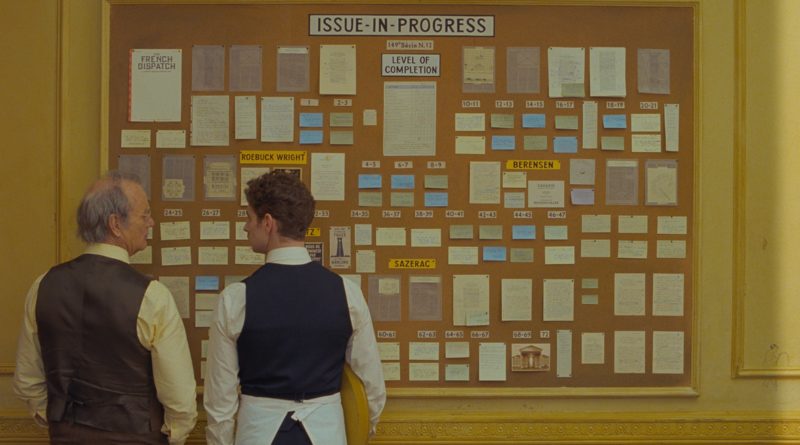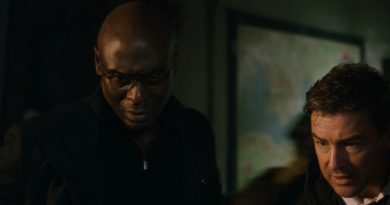‘The French Dispatch’ Review: A Fun Confection
As Wes Anderson‘s career evolves, his movies only seem to lean harder into his idiosyncratic style, for better or for worse. His latest, The French Dispatch, is no exception, likely to be an absolute delight for those who enjoy his work and to annoy the hell out of everyone who doesn’t. The only element of his usual style that he leaves out is the slow-motion walking montage, but the rest is all there in full force, the centered compositions, bright colors, flat space camera moves, knolling, etc. with a few brand new tricks and conceits. As someone who does like his movies in general, I enjoyed The French Dispatch quite a bit, in spite of all its indulgences.
The film is constructed as a read-through of the final issue of The French Dispatch of the Liberty, Kansas Evening Sun, an American magazine similar to The New Yorker based out of Ennui-sur-Blase (get it?), France. We first get an introduction to the magazine, followed by an opening travelogue, and then three more detailed articles that make up the bulk of the “issue”, all of which is dramatized for us in Anderson’s signature fashion. While billed as an ode to journalism, the movie is more of a tribute to the written word itself, with the content of the magazine resembling the kind of literary or creative nonfiction found in magazines like The New Yorker or McSweeney’s, rather than news reportage journalism we normally think of. Perhaps the most fascinating element of the movie is the manner in which it constructs its various narratives to mimic the rhythms and movements of the written word, rather than film. The same way that a written story digresses and jumps around in time and place, moved by the logic of ideas rather than the logic of time, the movie is surprisingly adept at embodying this quality, as the three central stories all leap around in time and digress from their main path to expand upon a particular subject before returning to the main narrative, all assisted by hilariously verbose narration from the stories’ main characters. The result is surprisingly coherent, cinematic, and often quite fun, if occasionally disorienting.
The majority of the movie covers three stories, or “articles”:
- The Concrete Masterpiece – Moses Rosenthaler (Benicio Del Toro) serves a prison sentence for homicide and becomes an icon in the art world after producing a series of experimental paintings inspired by his infatuation with his prison guard, Simone (Lea Seydoux). Narrated by an art historian (Tilda Swinton).
- Revisions to a Manifesto – Investigative journalist Lucinda Krementz (Francis McDormand) becomes embedded with a group of student revolutionaries led by Zeffirelli (Timothee Chalamet) who can’t quite figure out what they’re revolting against or why.
- The Private Dining Room with the Police Commissioner – Food critic Roebuck Wright (Jeffrey Wright) reviews the cuisine of renowned police cook Lt. Necaffier (Stephen Park) during a hostage situation.
Each one is classic Wes Anderson, both silly and melancholic, each managing to wrench a few drops of sweet sincerity from a great pool of irony. Each one stands well on its own, but The Concrete Masterpiece was by far my favorite. They also bring a suite of fun and interesting cinematic tricks and techniques to enliven their stories. All make heavy use of both black and white and color photography, with black and white being used for the main narrative and color being used for flashbacks, digressions, or to draw emphasis to a particular moment of beauty or humanity witnessed by the characters. Revisions to a Manifesto makes heavy use of movable sets to create a fun, theater-like experience for all the flashbacks and the final story makes heavy use of 2-D animation for its action sequences. All three are also, in one way or another, about art and the ways it enhances and transforms the world, whether via painting, literature, or cooking, again bringing in the selective use of color photography for emphasis.
If the film has one major flaw it’s that all the elements don’t coalesce in any meaningful way. For all its density and trickery and allusiveness, The French Dispatch is a series of unrelated episodes, each fun in their own right, but not playing with or enhancing each other. Another is that its love for the written word leads it to being sometimes overwhelmingly verbose, which I found funny, but some might find irritating.
All that said, I think it’s a great use of 100 minutes and a whole lot of fun to watch. Or it might just bug the shit out of you.




